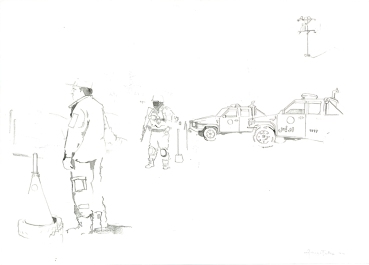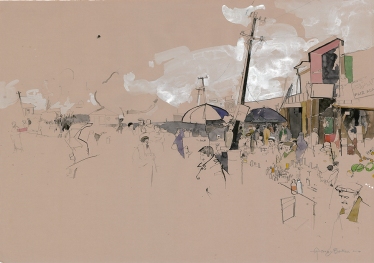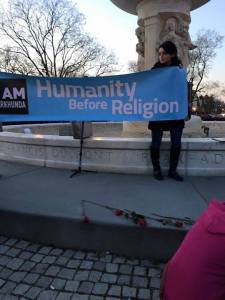Journalist and reportage illustrator George Butler travelled to Afghanistan in late 2014 – in the midst of British and international troop withdrawal after their thirteen years long presence. George drew everyday life in villages and cities across the country, offering a compelling insight into a country living with conflict. In 2013, the Next Century Foundation (NCF) and the International Communications Forum (ICF)awarded George with the International Media Awards for his drawings of the Syrian refugee crisis in Lebanon. The International Media Awards, which began in 2004, is an annual award ceremony held in London that acknowledges journalists who work in and on the Middle East and North Africa.
‘Day to day life seems to continue at the Faizabad market as any market might. People pour out of the mosque on the other side of the street in this north eastern Afghan city. One man sells a partridge in a wicker cage, another any bathroom product you could ever imagine. There is also the mobile phone credit man and the fruit seller’s cheeky son.’
In Kabul
George describes: ‘Life in Kabul over the last 30 years has not been easy by any stretch of an outsider’s imagination. At the end of 2014, international combat troops were set to have drawn down from Afghanistan. However, in reality there is still an international military presence. With regular explosions targeted at the prominent places in the Kabul the local and Military Police spend much more of their time at checkpoints. It is a particularly vulnerable time for them. It is not though the aggressive unfriendly place you might imagine from the news.’

Checkpoint
‘I had been given permission by the Chief of Police of Kabul’s District 10 to draw at one of their checkpoints. These have become commonplace due to the heightened security risk. With this in the back of my mind I drew quickly and this was all I finished before deciding it was time to leave. Westerners and the police force were high up on the list of targets and the two together would have at some stage attracted unwanted attention.’
George’s drawings are exhibited in the Imperial War Museum North in Manchester from 21st February until 6th September 2015.

